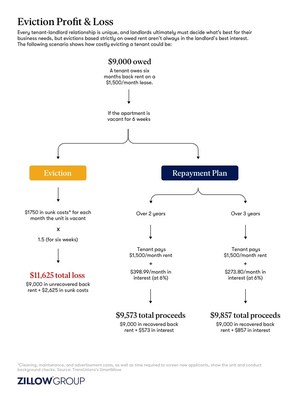As Eviction Cliff Nears, Here's How Millions Can Keep Their Homes
As the federal eviction moratorium nears its expiration on March 31, 2021, a Zillow analysis reveals over 3 million renters are at risk of eviction, with forecasts suggesting between 130,000 to 660,000 households could face eviction. The analysis highlights the urgent need for federal support, stressing that while many renters may fear eviction, not all will be evicted as landlords may opt for repayment plans. The recently passed federal stimulus includes $45 billion in rental aid, yet distribution challenges persist, raising concerns about a potential eviction crisis without effective governmental action.
- The federal stimulus includes $45 billion in rental assistance aimed at supporting vulnerable renters and landlords.
- Zillow estimates that between 130,000 and 660,000 families may actually face eviction, suggesting a lower potential impact than initially feared.
- The expiration of the eviction moratorium on March 31, 2021, may lead to widespread evictions if not paired with supportive measures.
- Over 8.3 million renters reported being behind on rent payments, with 16.8% indicating they are 'very likely' to be evicted in the next two months.
Insights
Analyzing...
SEATTLE, March 29, 2021 /PRNewswire/ -- More than three million renters say they are at risk of losing their homes with the federal eviction moratorium set to expire this week, but a new Zillow analysis shows the number of households evicted could be as low as 130,000, depending on government action, the pace of economic recovery, and how landlords respond.
That range highlights the need for federal intervention -- both a continuing moratorium and additional assistance that will help not only struggling renters but also their landlords, such as the $45 billion in rental assistance in the recently passed federal stimulus bill.
"Job disruptions and economic hardships brought by the pandemic have hit renters particularly hard, and the number at risk for eviction is staggering. Although the path forward is uncertain, there are still ways for policymakers to keep the vast majority of renters in their homes," said Chris Glynn, senior managing economist at Zillow. "We know two things for certain: the current eviction moratorium is succeeding at keeping renters in their homes, and millions of renters believe that they will be evicted in coming months. How many actually are evicted depends on the economic recovery and individual landlord decisions."
Forecasting the number of likely evictions
According to Zillow's analysis of the Census Bureau's Household Pulse Survey, some 3.4 million Americans say they are at risk of eviction this spring. As few as 130,000 to as many as 660,000 renter households ultimately could be evicted, depending on the federal moratorium, which is currently set to expire March 31, the economic recovery, and individual landlord decision-making.
More than 8.3 million U.S. renters reported being behind on rent payments as of March 15, with
However, with no historical precedent for this potential crisis, predicting how small the fraction might be once the moratorium expires is extremely difficult, especially with remaining uncertainty around federal policies and how landlords are able to respond.
Landlords are facing difficult choices
Every tenant-landlord relationship is unique, but evictions based strictly on owed rent aren't always in the landlord's best interest. The process of evicting a tenant is time-consuming, and in the end, landlords might find themselves struggling for several months to fill vacant units, which will ultimately cost them even more.
"Landlords are willing to work with tenants, and when the moratoria end we would much rather find a solution than evict," says Kellie Tollifson, owner and vice president of operations of T-Square Real Estate Services. "It's all about maintaining a relationship and open communication to figure out the best path for your unique situation. Landlords can direct tenants where to find assistance or work out payment plans that support both parties. Keeping people housed is the right thing to do, and it's also good for business, so landlords are highly motivated to work with renters to get through the pandemic together."
One mutually beneficial solution is offering a repayment plan and amortizing the back rent into ongoing rent payments, with landlords effectively serving as private creditors as they recover back rent over time. In this scenario, the benefit to the renter is avoiding an eviction, and the landlord is made financially whole. However, that might not be feasible for landlords who need a steady cash flow to make mortgage payments and remain afloat.
Last year, many young adults left their rentals to move back home, and one-third of rental listings were offering concessions this past fall as landlords tried to entice renters with benefits such as free parking or one-month free rent. And now with millions of U.S. renters at risk of eviction coupled with increased rent growth across the U.S., finding new tenants without a record of evictions and with liquid funds to make security deposits may prove extremely challenging.
An eviction crisis could be avoided with the right federal support
The Centers for Disease Control and Prevention (CDC) recently sent a proposal to the Office of Management and Budget, leaving many wondering if federal officials are looking to extend the moratorium set to expire on March 31. And while an extension would protect renters from eviction, the policy should be coupled with relief for landlords and rental assistance programs to support both and avoid an eviction crisis.
The recent federal stimulus bill was an invaluable lifeline in delivering direct economic relief, providing
"The ongoing challenge for policymakers is to keep renters in their homes without overburdening landlords," according to Glynn. "Further extending the eviction moratorium would achieve one goal but would also prolong the financial stress on individual landlords. Eventually the federal moratorium will end, back rents will come due, and landlords will be able to evict. Avoiding an eviction crisis will require that landlords, tenants, financial institutions, and policymakers work together to find constructive and creative ways to keep renters in their homes and make landlords financially whole. The alternative is millions of evictions, and the social and economic costs of that are unimaginable."
An extended moratorium is a temporary bandage that has potentially damaging repercussions in the future, if not paired with other relief programs. Robust economic recovery and expedited distribution of fiscal support to renters and landlords is needed to prevent a potential eviction crisis, if the moratorium is extended, and keep landlords and renters in their homes.
About Zillow Group:
Zillow Group, Inc. (NASDAQ: Z and ZG) is reimagining real estate to make it easier to unlock life's next chapter.
As the most-visited real estate website in the United States, Zillow® and its affiliates offer customers an on-demand experience for selling, buying, renting or financing with transparency and nearly seamless end-to-end service. Zillow Offers® buys and sells homes directly in dozens of markets across the country, allowing sellers control over their timeline. Zillow Home Loans™, our affiliate lender, provides our customers with an easy option to get pre-approved and secure financing for their next home purchase. Zillow recently launched Zillow Homes, Inc., a licensed brokerage entity, to streamline Zillow Offers transactions.
Zillow Group's brands, affiliates and subsidiaries include Zillow®; Zillow Offers®; Zillow Premier Agent®; Zillow Home Loans™; Zillow Closing Services™; Zillow Homes, Inc.; Trulia®; Out East®; StreetEasy® and HotPads®. Zillow Home Loans, LLC is an Equal Housing Lender, NMLS #10287 (www.nmlsconsumeraccess.org).
1 Zillow's estimate is based on the Census Bureau's latest Household Pulse Survey (HPS). The analysis assigns eviction probability distributions to verbal survey responses like 'very likely', 'somewhat likely', 'not very likely', and 'not at all likely'. HPS is the best current source of insight into the magnitude of a potential eviction crisis.
![]() View original content to download multimedia:http://www.prnewswire.com/news-releases/as-eviction-cliff-nears-heres-how-millions-can-keep-their-homes-301257286.html
View original content to download multimedia:http://www.prnewswire.com/news-releases/as-eviction-cliff-nears-heres-how-millions-can-keep-their-homes-301257286.html
SOURCE Zillow








